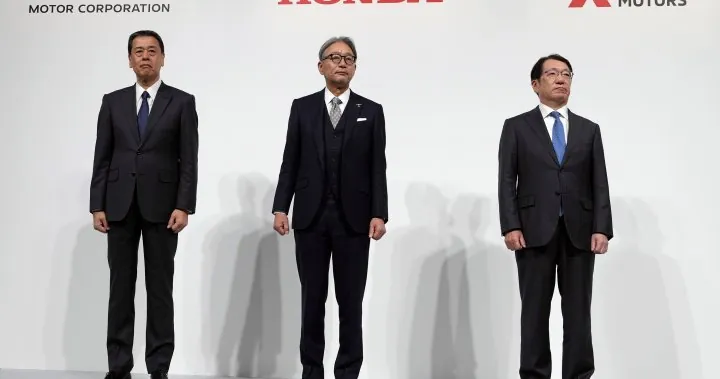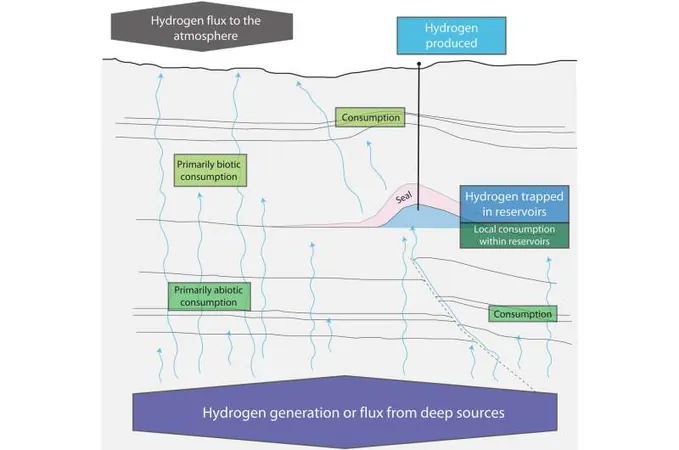
Groundbreaking Merger: Nissan and Honda Set to Unite by 2026 – The Automotive Game Changer!
2024-12-23
Author: Olivia
Introduction
In a bold move that could reshape the future of the automobile industry, Japanese giants Honda and Nissan have announced their intentions to merge, creating the world's third-largest automaker by sales. This strategic alliance comes as the automotive landscape rapidly evolves, particularly with the shift towards electric vehicles and sustainable mobility.
Memorandum of Understanding
On Monday, the two automakers revealed they had signed a memorandum of understanding, and Mitsubishi Motors Corp., a smaller member of the Nissan alliance, will also participate in the discussions. This merger highlights an urgent need for Japanese automakers to catch up with competition from rapidly advancing electric vehicle manufacturers, especially from China’s BYD and the juggernaut Tesla, which has been steadily increasing its share of the market.
Plans for Integration
Honda's President, Toshihiro Mibe, outlined plans for a joint holding company that will integrate operations between Honda, Nissan, and Mitsubishi while benefitting from their unique brand identities. The goal is to formalize the merger by June and list the newly formed entity on the Tokyo Stock Exchange by August 2026. Mibe did emphasize, however, that the merger's implementation is not guaranteed, with certain 'points that need to be studied and discussed' before proceeding.
Potential Impact on the Market
Should this merger take place, it could potentially create a colossal company valued at over $50 billion, thereby granting Honda, Nissan, and Mitsubishi the scale required to effectively rival industry leaders like Toyota and Volkswagen. As it stands, Toyota continues to dominate with sales of 11.5 million vehicles in 2023, while the combined production of Honda, Nissan, and Mitsubishi amounts to about 8 million.
Leadership's Vision
Citing the necessity for 'bold change,' Mibe stated, 'We have come to the realization that in order for both parties to be leaders in this mobility transformation, it is essential to go beyond mere collaboration.' In prior agreements, the three companies had already started sharing components for electric vehicles and researching software for autonomous driving to facilitate their respective electrification efforts.
Speculation and Challenges
Interestingly, speculation surrounding a potential partnership with Taiwan iPhone maker Foxconn surfaced earlier. Although reports indicated Foxconn was interested in purchasing shares from Nissan's alliance partner, Renault SA, Nissan's CEO Makoto Uchida refuted any direct approach from Foxconn, acknowledging the challenges Nissan faces in the current market climate.
Operational Hurdles
Both companies have faced operational hurdles. Nissan's recovery from a scandal involving former chairman Carlos Ghosn continues to loom large. Ghosn, who fled to Lebanon after being accused of fraud and misuse of assets—charges he vehemently denies—has labeled the merger as a 'desperate move.'
Industry Insights
Industry experts suggest that the merger might allow Honda to acquire Nissan's robust lineup of SUV models and gain invaluable expertise in electric vehicle technologies, especially regarding battery production and hybrid powertrains.
Job Cuts and Financial Struggles
However, Nissan's recent announcement of cutting about 9,000 jobs—roughly 6% of its global workforce—highlights its struggle to adapt. Facing financial losses, Uchida pledged to enhance efficiency and profitability, maintaining that integration could lead to greater overall value for consumers.
Investor Reactions
Fitch Ratings, while downgrading Nissan's credit outlook to 'negative,' has noted the automaker's stability and significant cash reserves. Following news of the merger talks, Nissan's stock surged by 20%, highlighting investor confidence, while Honda's shares climbed as well, reflecting optimism surrounding the merger.
Conclusion
The impending consolidation underscores a significant trend within the auto industry, where adaptation and synergy have become essential to survival in an increasingly competitive and technologically advanced global market. Japanese Cabinet Secretary Yoshimasa Hayashi emphasized the necessity for automotive firms to remain competitive amidst these transformative challenges, reinforcing the sentiment that strategic measures are imperative for survival in this dynamic landscape. Stay tuned for updates as the automotive world holds its breath—could this merger spell a new era for Japanese automakers?









 Brasil (PT)
Brasil (PT)
 Canada (EN)
Canada (EN)
 Chile (ES)
Chile (ES)
 España (ES)
España (ES)
 France (FR)
France (FR)
 Hong Kong (EN)
Hong Kong (EN)
 Italia (IT)
Italia (IT)
 日本 (JA)
日本 (JA)
 Magyarország (HU)
Magyarország (HU)
 Norge (NO)
Norge (NO)
 Polska (PL)
Polska (PL)
 Schweiz (DE)
Schweiz (DE)
 Singapore (EN)
Singapore (EN)
 Sverige (SV)
Sverige (SV)
 Suomi (FI)
Suomi (FI)
 Türkiye (TR)
Türkiye (TR)